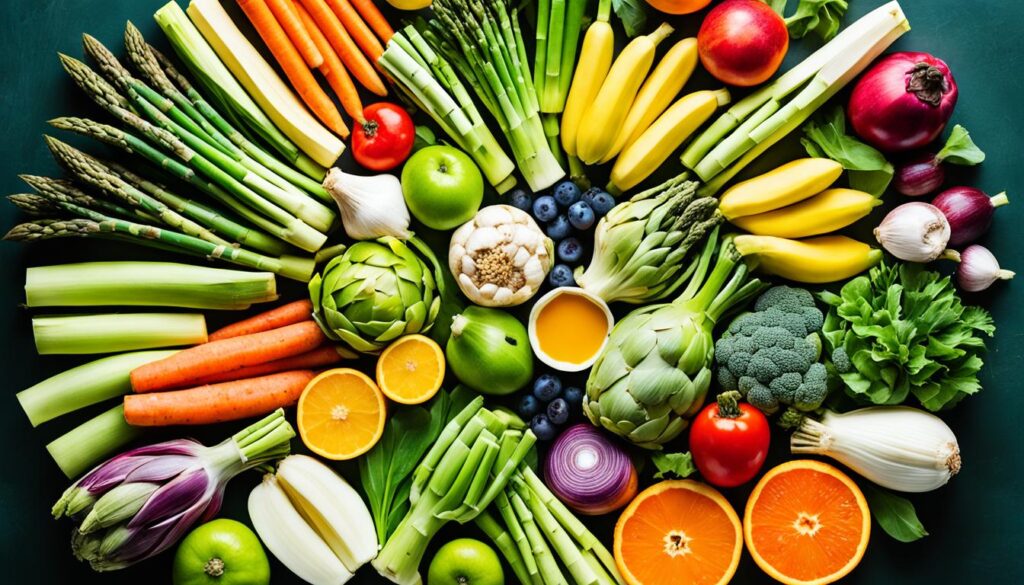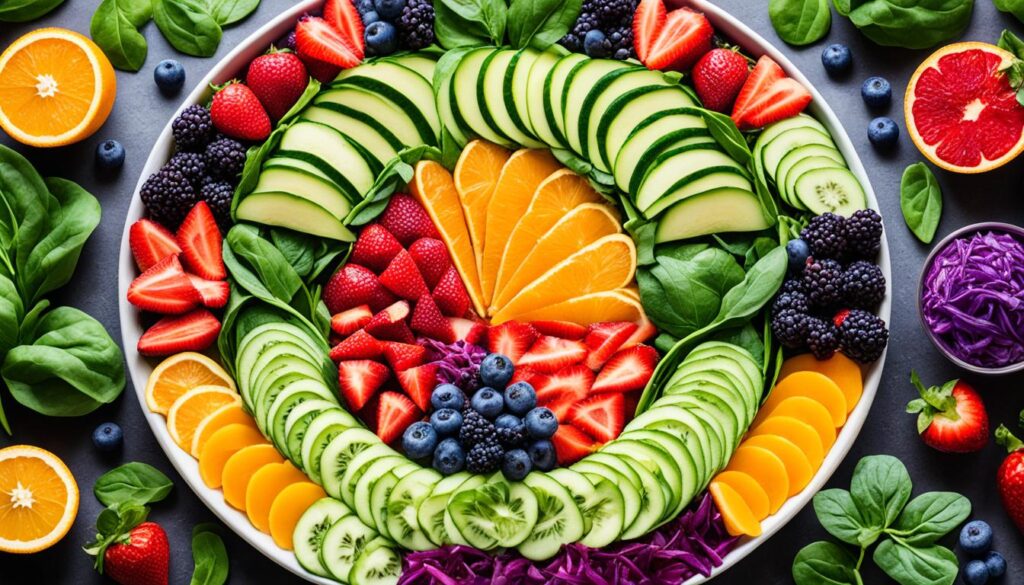Did you know that your gut health plays a crucial role in your overall well-being? It’s true! The balance of good and bad bacteria in your gut, known as your microbiome, can have a significant impact on everything from digestion to immunity.
But here’s the surprising part: your gut bacteria outnumber your body’s cells by a whopping 10 to 1! That’s right, you’re more bacteria than human!
That’s why taking care of your gut health is so important. And one of the most effective ways to support a healthy gut is through your diet. By incorporating the right foods into your meals, you can nourish your gut, promote the growth of beneficial bacteria, and prevent chronic diseases.
Key Takeaways:
- Your gut health is influenced by the balance of good and bad bacteria in your microbiome.
- Probiotics, prebiotics, fiber, polyphenols, and fermented foods are key components of a gut-friendly diet.
- Eating the right foods can support a healthy gut and help prevent chronic diseases.
- Probiotic-rich foods like sauerkraut, kimchi, and yogurt can help balance your gut bacteria.
- Prebiotic foods like fruits, vegetables, and whole grains feed the good bacteria in your gut.
Probiotic-Rich Foods for a Healthy Gut
When it comes to maintaining a healthy gut, incorporating probiotic-rich foods into your diet is essential. Probiotics are beneficial bacteria that support optimal gut health and overall well-being. They help balance your gut bacteria, prevent chronic diseases, boost immunity, and improve digestion.
Here are some probiotic-rich foods that you can add to your daily meals:
- Sauerkraut: This fermented cabbage is not only delicious but also packed with probiotics. Adding sauerkraut to your meals can help improve digestion and promote a healthy gut.
- Kimchi: A staple in Korean cuisine, kimchi is made from fermented vegetables, such as cabbage and radishes. Its tangy flavor and probiotic content make it an excellent addition to your diet.
- Miso: A traditional Japanese seasoning, miso is made from fermented soybeans. It is commonly used in soups and sauces and contains beneficial bacteria that promote gut health.
- Kefir: A fermented milk drink, kefir is rich in probiotics and can enhance the diversity of your gut bacteria. It is a great alternative to dairy milk for those with lactose intolerance.
- Yogurt: Yogurt is perhaps the most well-known probiotic-rich food. Opt for plain, unsweetened yogurt with live active cultures to reap the maximum gut health benefits.
- Kombucha: A fizzy, fermented tea, kombucha is a rich source of probiotics and antioxidants. It can aid digestion and support a healthy gut microbiome.
Incorporating these probiotic-rich foods into your diet can help maintain a healthy gut and improve overall digestion. Experiment with different recipes and enjoy the flavors and benefits that these foods have to offer.
To provide visual inspiration, here’s an image showcasing some probiotic-rich foods:
Remember, a diverse and balanced diet is key to promoting optimal gut health. Consider including these probiotic-rich foods in your meal planning and enjoy the benefits of a healthy gut.
Prebiotic Foods for Nourishing Your Gut
When it comes to gut health, it’s not just about consuming probiotics. Prebiotics also play a crucial role in supporting the growth of beneficial gut bacteria and improving digestion. Prebiotics are fibers that serve as food for the good bacteria in your gut, helping them thrive and maintain a healthy balance.
You can find prebiotics in a variety of foods, including:
- Apricots: These juicy fruits are not only delicious but also packed with prebiotic fiber.
- Artichokes: Known for their unique taste and texture, artichokes are a great source of prebiotics.
- Almonds: These crunchy nuts are not only a tasty snack but also rich in prebiotic fibers.
- Onions: Whether raw or cooked, onions are a versatile ingredient that can add a flavorful boost to your meals while supporting your gut health.
- Sunchokes: Also known as Jerusalem artichokes, sunchokes are a root vegetable that contains a significant amount of prebiotic fiber.
By incorporating these prebiotic foods into your daily diet, you can provide your gut with the essential fuel it needs to maintain a healthy environment. The growth of beneficial gut bacteria can lead to improved digestion, enhanced nutrient absorption, and overall gut health.

| Prebiotic Foods | Prebiotic Fiber Content per 100g |
|---|---|
| Apricots | 2g |
| Artichokes | 5g |
| Almonds | 12g |
| Onions | 2.5g |
| Sunchokes | 16g |
These fiber-rich foods can make a significant impact on your gut health. Including them in your meals can help support your digestive system, increase beneficial gut bacteria, and ultimately contribute to improved overall health and well-being.
Fiber-Rich Foods for a Healthy Digestive System
Fiber plays a crucial role in maintaining a healthy digestive system. It provides a range of benefits, including adding bulk to your stool, promoting regular bowel movements, and preventing constipation. Including fiber-rich foods in your diet can significantly contribute to a healthy gut and improved digestive function.
When it comes to fiber, whole grains and fruits are excellent choices. Foods like quinoa and sorghum are whole grains that contain high amounts of fiber. They not only help regulate bowel movements but also provide essential nutrients for overall health.
| Fiber-Rich Foods | Fiber Content (per 100g) |
|---|---|
| Quinoa | 2.8g |
| Sorghum | 6.9g |
| Berries (e.g., raspberries, blackberries) | 6-8g |
| Bananas | 2.6g |
Additionally, incorporating fiber-rich fruits like berries and bananas into your diet can further enhance your digestive health. Berries, such as raspberries and blackberries, are not only delicious but also packed with fiber and antioxidants. Bananas provide a good amount of dietary fiber as well.
Here are some ways to incorporate these fiber-rich foods into your diet:
- Add quinoa to salads or use it as a base for grain bowls.
- Include sorghum in your soups or stews.
- Mix berries into your breakfast smoothies or enjoy them as a healthy snack.
- Have a banana as a quick and easy on-the-go snack or add slices to your oatmeal.
By including these fiber-rich foods in your diet, you can support a healthy digestive system and achieve optimal gut health.
Powerful Polyphenols for Gut Healing
Polyphenols are natural compounds found in plants that have powerful antioxidant and anti-inflammatory properties. These bioactive compounds have been shown to play a crucial role in gut healing and overall gut health.
Foods rich in polyphenols, such as ginger, garlic, broccoli, and berries, can help reduce inflammation in the gut. By reducing inflammation, these foods contribute to the healing process of the gut, promoting optimal gut health.
In addition to their anti-inflammatory effects, polyphenols also offer numerous digestive benefits. They can help improve digestion, enhance nutrient absorption, and support a healthy gut microbiome.
By incorporating polyphenol-rich foods into your diet, you can harness the healing power of these compounds and support optimal gut health. Including foods like ginger, garlic, broccoli, and berries in your meals and snacks is a delicious way to take care of your gut and promote overall wellness.

